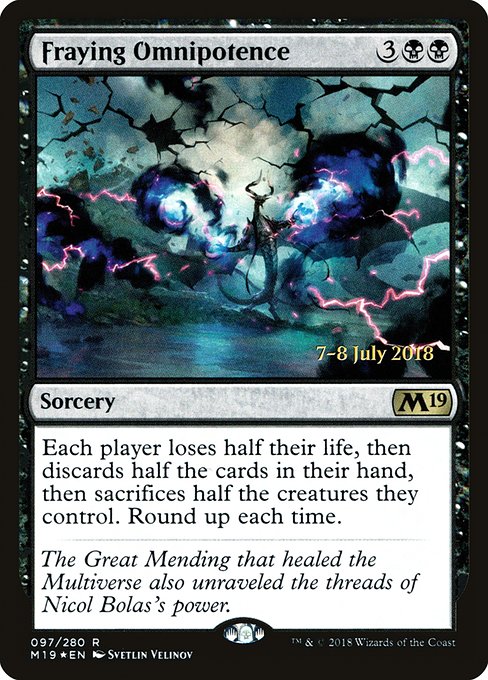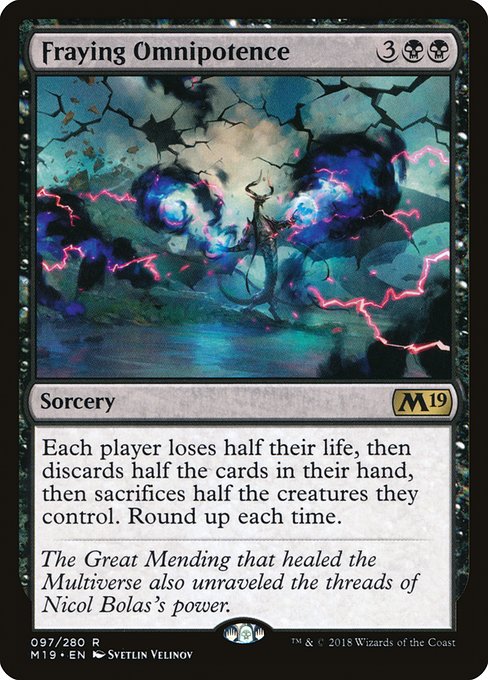standard
future
historic
gladiator
pioneer
explorer
modern
legacy
pauper
vintage
penny
commander
brawl
alchemy
paupercommander
duel
oldschool
premodern
Rulings
Because the instructions are followed in order, abilities of the creatures a player will sacrifice may modify or trigger on losing life, discarding cards, and/or sacrificing creatures. Abilities that trigger this way will resolve after Fraying Omnipotence is done resolving.
In a Two-Headed Giant game, Fraying Omnipotence causes each player to lose half of their team’s life, rounded up. This means that teams at an even life total will have 0 life, and teams at an odd life total will have -1 life. The game then ends in a draw.
When Fraying Omnipotence resolves, first each player loses the appropriate amount of life at once. Next, the player whose turn it is chooses an appropriate number of cards in hand without revealing them, then each other player in turn order does the same, and then those cards are all discarded simultaneously. Then, the player whose turn it is chooses an appropriate number of creatures they control. Each other player in turn order does the same, knowing choices made by previous players. Finally, all of the chosen creatures are sacrificed simultaneously.
The amounts that are lost are rounded up, not the amounts kept. For example, a player with 5 life, five cards in hand, and five creatures would lose 3 life, discard three cards, and sacrifice three creatures.
In a Two-Headed Giant game, Fraying Omnipotence causes each player to lose half of their team’s life, rounded up. This means that teams at an even life total will have 0 life, and teams at an odd life total will have -1 life. The game then ends in a draw.
When Fraying Omnipotence resolves, first each player loses the appropriate amount of life at once. Next, the player whose turn it is chooses an appropriate number of cards in hand without revealing them, then each other player in turn order does the same, and then those cards are all discarded simultaneously. Then, the player whose turn it is chooses an appropriate number of creatures they control. Each other player in turn order does the same, knowing choices made by previous players. Finally, all of the chosen creatures are sacrificed simultaneously.
The amounts that are lost are rounded up, not the amounts kept. For example, a player with 5 life, five cards in hand, and five creatures would lose 3 life, discard three cards, and sacrifice three creatures.
Rulings
Because the instructions are followed in order, abilities of the creatures a player will sacrifice may modify or trigger on losing life, discarding cards, and/or sacrificing creatures. Abilities that trigger this way will resolve after Fraying Omnipotence is done resolving.
In a Two-Headed Giant game, Fraying Omnipotence causes each player to lose half of their team’s life, rounded up. This means that teams at an even life total will have 0 life, and teams at an odd life total will have -1 life. The game then ends in a draw.
When Fraying Omnipotence resolves, first each player loses the appropriate amount of life at once. Next, the player whose turn it is chooses an appropriate number of cards in hand without revealing them, then each other player in turn order does the same, and then those cards are all discarded simultaneously. Then, the player whose turn it is chooses an appropriate number of creatures they control. Each other player in turn order does the same, knowing choices made by previous players. Finally, all of the chosen creatures are sacrificed simultaneously.
The amounts that are lost are rounded up, not the amounts kept. For example, a player with 5 life, five cards in hand, and five creatures would lose 3 life, discard three cards, and sacrifice three creatures.
In a Two-Headed Giant game, Fraying Omnipotence causes each player to lose half of their team’s life, rounded up. This means that teams at an even life total will have 0 life, and teams at an odd life total will have -1 life. The game then ends in a draw.
When Fraying Omnipotence resolves, first each player loses the appropriate amount of life at once. Next, the player whose turn it is chooses an appropriate number of cards in hand without revealing them, then each other player in turn order does the same, and then those cards are all discarded simultaneously. Then, the player whose turn it is chooses an appropriate number of creatures they control. Each other player in turn order does the same, knowing choices made by previous players. Finally, all of the chosen creatures are sacrificed simultaneously.
The amounts that are lost are rounded up, not the amounts kept. For example, a player with 5 life, five cards in hand, and five creatures would lose 3 life, discard three cards, and sacrifice three creatures.
Your collection? Your decks?
Want to manage your collection and/or create decks?



 0
0
 0.38€
0.38€